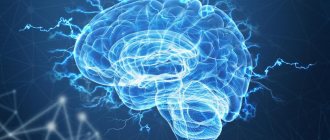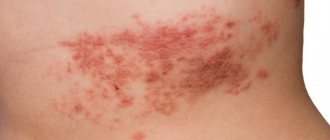How to recognize nervous exhaustion
It is difficult to define, because exhaustion is often confused with physical illnesses. Symptoms of nervous exhaustion often include headaches, depression, upset stomach, bad mood, etc. A hidden symptom forces the visible problem to be treated, while exhaustion remains in the body, turning into a chronic form.
Causes of nervous exhaustion
Constant nervous and physical stress has a negative impact on a person’s internal resources. Possible causes of exhaustion include:
- Overwork at work;
- Chronic stress;
- Hyperresponsibility for everything that happens;
- Past illness and surgery;
- Mental stress;
- Physical stress, for example childbirth.
Not all of the reasons listed above cause exhaustion. Each organism perceives what is happening in its own way, everything depends on the individual perception of a particular problem.
Signs indicating nervous exhaustion
- Increased irritability. A woman cannot cope with negative emotions; even the most insignificant situation makes her angry. Close people are the first to suffer from a violent reaction.
- Fast fatiguability. A person experiences a constant lack of strength, even if he has just woken up. Every day he struggles with the feeling of being overwhelmed and uncollected. It seems that the strength has left his body.
- Constant rush. A woman with nervous exhaustion is unable to stand calmly in one place for several minutes. She needs to be constantly on the move, sometimes her actions are chaotic and ill-considered.
- Pain in the head and muscles. Often psychological exhaustion is accompanied by headaches that do not depend on external factors. Intellectual activity is zero. It is difficult for a person to concentrate and cope with basic tasks. This provokes forgetfulness and jumping from one thing to another.
- Insomnia. Obsessive thoughts do not allow a person to fall asleep, he replays unpleasant events and moments in his head, worries about what may not happen. If you manage to fall asleep, then the person sleeps lightly; the slightest rustle can wake him up. After such a dream, the woman feels broken.
- A nervous state is accompanied by fear, anxiety, back pain, gastrointestinal problems, and inflammatory processes. Chronic forgetfulness syndrome appears; it is difficult to remember simple information.
It is easier to cope with nervous exhaustion at the initial stage by involving relatives and other people interested in a speedy recovery.
Key Defining Points
When a person is almost or completely healthy, he has an excellent mood, a stable good mood, a thirst for life, the ability to respond to jokes and fully use all the information that surrounds him. As soon as her body begins to stubbornly conquer an incomprehensible disease, all this instantly evaporates, and no holidays, celebrations or matinees bring the expected pleasure.
That's right, where does it come from if the brain is not allowed to fully rest and the body is not allowed to get enough sleep?
At such moments, a person wants to close his heavy eyelids and plunge into a sweet slumber. But that was not the case: the autonomic nerve endings are in severe irritation, and a period of chronic insomnia begins. Some try to take another benefit from this state and get down to work. But it turns out that the strength is not enough even to fully operate computer programs and even fill out documents.
Signs of total exhaustion of the nervous system are quite often confused with banal laziness, bad character or some kind of physical illness, which forces a person to treat not the problem itself, but its manifestations: headaches, depression and dystonia.
The condition does not improve and the following symptoms become more severe:
- Instability of emotions, short temper and extreme irritability;
- Inability to realize your problems and ostentatious joy;
- Impatience and, as a result, unreasonable aggression;
- Inadequacy in relation to the crowd;
- Lack of a sense of humor;
- Fatigue and weakness that do not go away even after a long sleep;
- With nervous exhaustion, a person is tormented by chronic headaches and the inability to concentrate on important aspects of his life;
- Ringing in the ears appears, clarity of vision disappears, body weight decreases and there is no craving for food;
- Sexual dysfunction, nightmares, confusion in thoughts and judgments, phobias, unreasonable anxiety and forgetfulness, speech impairment, etc. may begin;
- When the nervous system is exhausted, there may be periodic small tremors.
All these signs make a person feel insecure, complexes and bad habits are formed. The latter signal that the patient is trying with all his might to correct his condition, without realizing its true cause.
Provoking factors
The reasons that cause this pathological condition may be:
- Backbreaking and exhausting physical labor;
- Monotonous, boring and constant mental work;
- Work according to an irregular schedule;
- Constant stress and annoying circumstances;
- Chronic lack of sleep;
- Improper and insufficient nutrition, which causes vitamin deficiency;
- Hidden infections and previous operations;
- Injuries, poisoning of the body with toxins;
- Postpartum period and somatic pathologies.
All this provokes that very neurasthenic trembling, which indicates a neurasthenic state.
In fact, this state of affairs can be called a total “burnout” of the body, that is, its weakening.
Drug therapy
It is clear that such symptoms should not be ignored, and treatment of depletion of the nervous system should be carried out immediately after the appropriate diagnosis is made.
The fastest positive effect is achieved by taking specific medications that belong to three broad groups of drugs:
- Vasodilators. Treatment with them helps to improve cerebral blood circulation, and at the same time relieves pain;
- Nootropics. The action of such medications is aimed at optimizing the activity of brain cells;
- Vitamins belonging to group B. They activate and enhance all metabolic processes occurring in nerve cells;
- Calming and sedative drugs that can improve sleep and relieve vegetative internal reactions.
Folk remedies
Treatment of chronic depletion of the nervous system with folk remedies involves the use of many medicinal plants.
But the most commonly used drugs are:
- Separately brewed and then mixed in equal proportions, decoctions of motherwort and valerian root;
- Dried chamomile flowers, a teaspoon of which is poured into a glass of boiling water, the drink is flavored with a spoon of honey, and taken immediately before bed;
- Dried rose hips. A spoonful of berries is placed in 250 ml of boiling water, everything is placed in a thermos for 12 hours, and consumed throughout the day with natural honey as a bite;
- Traditional healers use calamus root to treat nervous exhaustion. It is crushed, and in the amount of 3 tsp. pour 400 ml of boiling water. Medicine 20 min. boil under the lid and over low heat, then strain and drink during the day.
Nutrition correction
Diet No. 12 is a table that is often prescribed for depletion of the nervous system. It is necessarily accompanied by taking medications or treatment with folk remedies, giving up harmful addictions and normalizing the daily routine.
Quick page navigation
The real, pressing problem of our time is nervous exhaustion (neuro-emotional fatigue). It is a consequence of various negative factors affecting a person due to various circumstances. These are subjective experiences, constant mental tension and stressful conditions, inadequate sleep and rest, provoking instability of the nervous system, the development of neuroses and neurasthenia.
About the causes of nervous exhaustion
Every living organism, including humans, has innate instincts of self-preservation that trigger their hidden reserves under certain unfavorable conditions. A kind of reserve consists of immune, hormonal, nutritional and metabolic substances, which are used only in threatening circumstances due to extreme necessity.
Such a need can be provoked by prolonged and severe stress, passions and fussations (unexplained aggression), shock, trauma, excessive fatigue and a state of passion. In such states, a person is usually able, with concentration and composure, to solve his problem on his own. But only when the body has a resource reserve. If by this point it has been used up, and the negativity continues, this is a prerequisite for nervous exhaustion.
The causes of nervous exhaustion are based on various types of fatigue, ranging from physical to moral. Fatigue does not occur suddenly, but develops and accumulates gradually, increases, worsens and becomes a chronic condition, which often leads to depressive states.
To understand the genesis of the development of the disease, let us consider the scheme of the depletion of the protective resource reserve.
- A tense, anxious emotional state and stress when the nervous system is exhausted provoke the central nervous system to send certain signals to the endocrine, immune and cardiovascular systems. At this time, they become a priority for the body, although other areas of activity suffer from this, for example, sexual or digestive.
- Cardiovascular functions are impaired. Prolonged stress causes disturbances in heart rhythm and other heart problems.
- Depletion of phagocytic defense provokes prolonged stress, leading to a complete weakening of the immune system. As a result, chronic pathologies worsen and new infections, inflammatory reactions and processes develop in the form of candidiasis, dysbacteriosis, erosive and articular pathologies, rheumatism and skin diseases.
- Disturbances in digestive functions are manifested by signs of dysbiosis, ulcerative pathologies in the gastrointestinal tract, functional disorders and chronic enterocolitis.
Consequences of mental disorder
The symptoms of the disorder cannot be ignored; they have consequences.
A woman’s shattered nervous system affects her communication with others. Any situation is perceived with hostility, irritation and even anger appear. A person refuses to communicate with loved ones, believing that this will be better for everyone.
A severe form of exhaustion changes the attitude towards life and provokes mental problems. They are accompanied by obsessive manic thoughts and ideas. Personality degradation occurs.
It is no secret that mental illnesses provoke various diseases. Many women complain of candidiasis, herpes, and disruption of the endocrine system. Exhaustion of the nervous system provokes a disorder in the thyroid gland, and weight fluctuates.
Disorders provoke women to resort to bad habits, such as smoking, alcohol and even drugs. Such remedies only aggravate the situation, leading to prolonged depression.
Stage of resistance (resistance)
The transition of stress to this stage occurs if the body’s adaptive capabilities allow it to cope with the stressor. During this stage of stress, the functioning of the body continues, practically indistinguishable from normal. Physiological and psychological processes are transferred to a higher level, all body systems are mobilized. Psychological manifestations of stress (anxiety, excitability, aggression) decrease or disappear altogether. However, the body’s ability to adapt is not endless, and as the stress continues, the next stage of stress occurs.
In some ways similar to the first stage of stress. But in this case, further mobilization of the body’s reserves is impossible. Therefore, the physiological and psychological symptoms of this stage are actually a cry for help. At this stage, somatic diseases develop, and a lot of psychological disorders appear. With continued exposure to stressors, decompensation and severe illness occur, in the worst case, even death. When psychological causes of stress predominate, decompensation manifests itself in the form of severe depression or a nervous breakdown. The dynamics of stress at this stage are irreversible. only possible with outside help. This may involve eliminating the stressor or helping to overcome it.
Treatment of neurasthenia
The usual rhythm of life is reflected in a person’s psychological state. Pay attention to the duration and quality of sleep, nutrition, rest, walks.
- A person’s well-being and mood depend on nutrition. The diet should be balanced, containing vitamins and other elements that contribute to the development of protective functions in the body.
- Go to bed only when you feel tired. Don't force yourself to sleep if your body doesn't need rest. Reading books, watching TV and other things that can be done anywhere but in bed do not contribute to deep, sound sleep.
- Take a walk in the fresh air every day without exception. Give preference to evening walks. Instead of gatherings in a cafe, go with friends to the countryside, where you can have an active and fun time. Play sports, practice yoga, swim in the pool. Physical activity calms you down and puts you in a positive mood.
Don't let work take up all your free time. Set your priorities correctly and spend your free time profitably.
In some cases, the disease requires medication. Use antidepressants only as prescribed by a doctor, otherwise you can worsen the situation and undermine your health. Such drugs dull feelings of anxiety and fear. They have sedative, hypnotic, and anticonvulsant effects.
Balanced diet
The emotional state depends on nutrition; a lack of useful components leads to mental disorders. Regular consumption of vitamins and microelements helps improve the nervous system.
Add variety to your daily menu, which should consist of plant foods, cereals and seafood. Forget about simple carbohydrates, fatty foods, pickles, processed foods, sausages, sweets, and alcoholic drinks.
When you can't do without a doctor's help
Stress accompanies a person to varying degrees throughout his life. The nervous system reacts equally to positive and negative stimuli: the adrenal glands begin to actively produce adrenaline and cortisol. Depression or aggression is the body’s reaction to a malfunction of the nervous system. The average duration of a depressive state is 2-3 weeks.
By observing changes in one's own behavior, a person can provide primary assistance to himself. If you pay attention to proper nutrition in time, start taking vitamins and soothing medicinal decoctions, you can recover without additional help from a psychotherapist.
If the means used do not help and no changes for the better are observed within a month, you should urgently seek the help of a specialist. There are many methods of psychological therapy that help to get out of a depressive state without resorting to the help of powerful antidepressants.
What to remember
- Alternate work with rest.
- Ensure that you get good sleep; lack of sleep leads to irritation and other problems. Eat right.
- Be active. Play sports; physical activity relieves stress.
Our body is much more reliable than we think. We have hidden powers and capabilities that we don’t even suspect about. Until a certain point. Until when severe stress or serious nervous shock falls on our shoulders.
But the “emergency resource” in our body also has its limits. And when there is not enough of it, exhaustion of the nervous system occurs. The impetus for the ultra-rapid consumption of our vitality can be a constant lack of sleep, sudden strong emotions and shocks, as well as a complex surgical operation or injury.
In general, stress is sometimes even beneficial; it shakes up the body and strengthens it. But prolonged stress, which turns into chronic stress, completely depletes our strength. And sometimes there comes a time when only qualified specialist help can help us return to normal.
How to understand that a person is burning out
The main cause of burnout —
stress at work and the need to restrain emotions so as not to lash out at an annoying client or a picky manager. It turns out that every victim of work stress can burn out emotionally at some point.
Burnout: a typical scenario
- The stronger the stress, the less moral and physical strength a person has. Health is deteriorating. Gradually, a person stops communicating with friends and colleagues, because he has to waste energy on other people. Loneliness is added to moral decline.
- A person has neither time nor energy left to satisfy needs not related to work. Fatigue prevents you from thinking flexibly and adapting to new situations.
- Motivation falls, and indifference to work, on the contrary, grows. At the same time, both the quality of work and productivity deteriorate.
As a result, burnout leads to more severe conditions: physical exhaustion, exacerbation of psychosomatic diseases, etc.
The fewer opportunities a person has for self-realization outside of work, the more prone he is to workaholism. And since we all need a reason to respect ourselves, a person works more and more, eventually getting exhausted and, as a result, burnout.
Unfortunately, biological markers that clearly indicate burnout have not yet been discovered. This makes the syndrome difficult to prevent and even more difficult to treat. —
After all, you can’t go on sick leave without tests.
Causes of nervous exhaustion
Every person has a reserve of internal strength that helps to cope with daily problems and stress. If a person does not take everything to heart, rests and eats well, then the resources spent during the day are quickly restored during night sleep.
But no one is immune from misfortunes. Prolonged strong nervous or physiological stress, coupled with insomnia, can quickly use up a person’s entire reserve of strength, leading to exhaustion. And if strength is not restored, then general exhaustion of the body will occur.
Thus, the causes of nervous exhaustion can be:
- overwork due to prolonged work;
- severe physiological stress, such as childbirth;
- long experiences and stress;
- surgical operations;
- various diseases;
- emotional trauma;
- increased mental stress.
Since a person’s reserve of internal strength is individual, not every factor listed above can trigger excessive consumption of resources. In addition, people do not react in the same way, the recovery process is different for everyone and takes different times.
Symptoms of nervous exhaustion
Nervous exhaustion increases unnoticed and at first looks like ordinary fatigue. However, this condition gradually accumulates and subsequently, unnoticed by the patient, turns into a pathology, which should be treated by a qualified psychotherapy specialist.
A person can notice the first signs of problems with the body himself, simply by listening carefully to himself:
- constant fatigue;
- sleep disorders: the patient cannot fall asleep, despite being drowsy during the day;
- the appearance of an inexplicable feeling of anxiety, pessimism;
- the appearance of periodically palpable palpitations, blood pressure imbalance;
- increased sensitivity to external irritating factors (loud sounds, bright light, strong aroma, etc.);
- pain in the legs, arms, back (of unknown origin);
- unreasonable increase in temperature;
- uncomfortable condition in the stomach or intestines;
- non-seasonal exacerbation of chronic diseases (tonsillitis, gastritis, sinusitis, etc.).
Symptoms also appear, which are often noticed by the patient’s relatives and friends:
- the person becomes irritable, he may be irritated both by the environment or the behavior of loved ones, and by himself;
- a person becomes impatient, he begins to get nervous already in the first minutes of forced waiting;
- increased sensitivity to foreign aromas, sounds, flashes of light appears;
- sleep becomes sensitive and anxious, a person often wakes up from nightmares, groans in his sleep, and in the morning does not feel a surge of vigor and energy;
- even with light exertion, headache and weakness are noted;
- a person’s character changes – uncertainty appears, self-esteem falls;
- disturbances occur in the sexual sphere (decreased libido, erectile dysfunction, impotence, etc.);
- the patient takes on a lot, but cannot complete anything, becomes inattentive, absent-minded, memory and concentration deteriorate;
- Weight fluctuations may be observed, appetite disappears or increases, and a bad mood is constantly present.
The clinical picture can be divided into three stages:
- Hypersthenic stage: the patient experiences irritability and fussiness. He himself understands that something is happening to him, but he cannot cope with it on his own. Often does not control his actions and emotions, provokes quarrels and conflicts. Headache and muscle pain, lack of sleep, insomnia, lethargy and decreased ability to work appear;
- Stage of irritating weakness: the patient becomes hot-tempered, but quickly subsides. His thoughts are pessimistic and anxious. In addition to headaches, heart pain, digestive disorders, allergic reactions, shortness of breath, dizziness are added;
- Hyposthenic stage: the patient enters a state of apathy, he is not interested in anything, the mood is indifferent and depressed, close to depression.
Signs in women
One of the very first manifestations of hypocortisolism is a feeling of constant weakness. At first, sleep and rest reduce it, but as it progresses, patients wake up in the morning sleep-deprived and feel the need for stimulants - coffee, strong tea, energy drinks, which give a short-term burst of strength. At night, I usually experience insomnia, anxiety, and nightmares. Sleep becomes intermittent and shallow.
The following symptoms are typical:
- depressed mood background;
- low pressure;
- headache, dizziness;
- loss of appetite, alternating with sudden attacks of hunger, a tendency to salty, sweet, spicy foods;
- darkening of the eyes with a sudden change in body position;
- nausea, abdominal pain, unstable stool;
- disruption of the menstrual cycle;
- frequent colds, prolonged infections, transition to chronic forms;
- intolerance to medications or foods, allergic reactions;
- constant anxiety, irritability;
- memory loss, difficulty concentrating.
Intermittent and shallow sleep
The effect of nervous exhaustion on the body
- Immunity. Weakening of the body leads to frequent illnesses; a person is literally open to any viruses;
- Nervous system. Stress, lack of sleep and psycho-emotional overload provoke the release of large amounts of “stress hormones”, which are very harmful in large quantities;
- Heart. Cortisol and other stress hormones have a negative impact on the cardiovascular system. A person complains of heart pain, arrhythmia, severe pressure changes;
- Digestive system. Against the background of nervous exhaustion, cases of stomach ulcers and gastritis are not uncommon. Indigestion, weight gain or loss are the consequences of a lack of proper rest.
These were only the physical consequences of exhaustion of the nervous system. In addition, social connections and a person’s quality of life suffer. Fatigue prevents you from working normally and taking care of your family, communicating with loved ones and friends does not bring joy, and a person begins to take out all his irritation on his family. Exhaustion of the nervous system is close to borderline mental states, which without proper treatment leads to the development of mental illness.
Treatment of nervous exhaustion
The first thing to do at the beginning of therapy is to remove the irritating factor. Without this, treatment of nervous exhaustion will be extremely difficult and ineffective. Next, you must adhere to the following rules:
- Healthy and sound sleep. Nothing restores a person's strength like sleep. Night rest should be taken very seriously, because constant lack of sleep leads to the accumulation of fatigue;
- Enthusiasm. Writing, drawing, research, watching movies, reading books, dancing - any hobby should help in the treatment of nervous exhaustion, as it perfectly relieves its symptoms. In addition, the preventive effect will not take long to appear.
Nervous exhaustion, not aggravated by depression, can be cured without much difficulty using the above tips.
Treating nervous exhaustion with medications
A neurologist is the only non-psychiatric specialist who can determine nervous exhaustion. But the neurologist is not able to help solve the patient’s mental problems, so the reasons that led to this state will not be eliminated. Very often, with nervous exhaustion, vegetative-vascular dystonia is diagnosed. Experts prescribe the following medications for nervous exhaustion:
- Nootropic substances that support brain cells in a normal state are prescribed with caution, because they can increase irritability - these are alzepil, tenoten, pantogram, ceraxon, etc.;
- B vitamins - riboflavin, thiamine, thiacin - have a beneficial effect on the human nervous system.
Drugs for nervous exhaustion have a very good effect on the body, containing sedatives that can remove the feeling of tension, anxiety, make sleep normal, and improve the quality of rest.
Dangers of pathology
Diagnosis of the disease is difficult due to the similarity of symptoms with other disorders, for example, vegetative-vascular dystonia.
Nervous exhaustion can cause depression if the condition is not treated. Nervous exhaustion in some cases is accompanied by panic attacks, which also negatively affects the patient’s health.
Over time, phobias or obsessive states may develop. Without timely treatment, nervous exhaustion can lead to the development of various neuropsychiatric diseases.
With nervous exhaustion, symptoms and treatment largely depend on the characteristics of the patient’s body.
Traditional methods of treating nervous exhaustion
Herbal teas, tinctures and infusions of medicinal plants
1) rosehip infusion, due to its high content of carotene and vitamin C, will effectively boost the immune system, and the remaining active components, in particular B vitamins, will have a beneficial effect on the nervous system. For 250 ml of boiling water, take a tablespoon of crushed rose hips, steam for at least 12 hours in a thermos, take as a bite with acacia, St. John's wort or buckwheat honey (a tablespoon) 3-4 times a day for a month;
2) infusion of chamomile,
Thanks to essential oils and a unique combination of biologically active phytonutrients, it perfectly tones and calms the nerves. An infusion of chamomile with honey helps with insomnia. Take a teaspoon of dried inflorescences per glass of boiling water and infuse under the lid for about 15-25 minutes. Take as tea, warm, three times a day;
3) a decoction of calamus rhizome is prescribed as a tonic for depression of the central nervous system. Pour 3 teaspoons of crushed root into 400 ml of boiling water and simmer under the lid over low heat for about a quarter of an hour, after straining, take 100 ml three times a day half an hour before meals;
4) extract (tincture) of radiola rosea is prescribed as an effective remedy for stimulating the central nervous system, as well as for neurasthenic conditions, weakness, fatigue and decreased performance. Pour 50 grams of crushed dried rhizomes into a dark glass container with 0.5 liters of vodka or medicinal spirit diluted 1:1, seal tightly and leave in a dark, cool place for about 15 days. Take 25 drops 3 times a day, half an hour before meals, with water. For asthenia, the last dose should not be less than 4 hours before bedtime. For patients suffering from hypertension, start taking 5 drops three times a day, gradually increasing the dose to 10 drops (constant blood pressure monitoring).
How to avoid burnout at work
Modern researchers believe that we have two options:
- Increase the number of personal resources that can be used in work and life.
- Make sure you have a comfortable work environment.
Unfortunately, we rarely have enough power to change our workload or get rid of a demanding boss. However, we can change our lifestyle, protect ourselves from excess stress and increase our personal energy.
How to increase your personal energy
Learning to manage personal energy is the only way out of the situation:
1. Get enough sleep
Try to get at least 7 hours a night. A sleepy person has difficulty thinking and adapts poorly to new situations.
2. Eat well and properly
A lack of protein, fat or carbohydrates equals a lack of energy. Include fruits and vegetables in your diet, limit fatty foods and try to drink less alcohol. Drink enough water.
3. Play sports
Exercise helps increase the body's energy capacity. Spending an hour exercising even after a hard day can help prevent fatigue.
4.Alternate the load
Let periods of concentration be combined with periods when attention is unfocused. Meditate, paint, take care of plants, dance, do crafts, or just take a walk in the fresh air. Constant concentration leads to depletion of attention and will.
5. Find a hobby that is not related to your main job.
6. Breathe deeply
Ventilate your work area three times a day. If this is not possible, at least go outside to breathe three times a day for 10 minutes. Out for lunch? Try to walk at least a little*.
7. Breathe deeply and try «
ground yourself
»
This is especially useful if you are once again driven out of your temper. Feel your feet pressing on the floor, feel your own weight. Feelings from your own body are the best sedative.
8. Learn to manage stress
Stress itself is neither bad nor good, because its biological task is to teach us to better navigate new situations. Therefore, if you are facing several months of work without sleep and rest that you cannot avoid, focus on how this emergency will benefit you, what it will teach you and how much stronger you will become by going through this test.
9. Take care of yourself
If you feel discomfort in the workplace, try to understand where it comes from. Sometimes the cause of discomfort is things or circumstances that we can change. Headphones will save you from noise. For the lack of light - a table lamp, and for the cold - a blanket that you keep in your workplace and warm, comfortable socks.
*Most office centers have exceeded CO2 levels in the air. Building codes allow CO2 levels of up to 1400 ppm, but health codes say that 1000 ppm is already too much. With so much carbon dioxide in the air, it is difficult to concentrate, so a person feels lethargic and tired ahead of time.
Consequences of nervous exhaustion
- Problems with society, a person’s character deteriorates, the emotional assessment of what is happening and the perception of the world around him changes. People become angry, irritated, and communication problems arise. A person withdraws into himself and becomes a recluse;
- Loss of identity. The attitude towards life in general changes irreversibly, and mental illness may begin. Manic states and obsessive desires and ideas appear. A person’s personality degrades to the point of neglect of personal hygiene.
In order to prevent the occurrence of mental problems, it is necessary to eliminate the cause itself, in this case, to put the nervous system in order. Nervous exhaustion, which is best treated with the help of experienced doctors, may improve if you take our advice.
Nervous exhaustion is a special psycho-emotional state of a person, which is formed during difficult periods of life: stress, hard work, study, large amounts of information, especially of a negative nature, etc. Exhaustion of the nervous system significantly reduces a person’s quality of life, worsening the general condition and the ability to fully work, communicate and relax. It can be both a symptom and a cause of depression.
Laziness or illness: how to distinguish burnout from procrastination
American scientists Christina Maslach and Susan Jackson continued Freudenberger's research. Researchers have identified three main characteristics of burnout and created a questionnaire that measures these characteristics and understands the severity of the problem.
Three signs of professional burnout:
- Emotional exhaustion -
there are not enough emotional resources for work, a person gets tired quickly, problems with self-control begin - Depersonalization -
indifference to clients, patients and colleagues develops, the person becomes cynical - Reduction of personal achievements -
to a person suffering from emotional burnout, it seems that his efforts are in vain and his achievements
are
insignificant.
Over time, it became clear that not only employees of psychiatric clinics are susceptible to professional burnout. The problem occurs much more often, prevents people from working and enjoying it, and brings big losses to companies.
Causes
Prolonged physical and nervous stress, combined with insomnia, can quickly deplete a person’s internal reserves, which ultimately leads to exhaustion of the body. Causes of nervous exhaustion include:
- Severe physical stress, such as childbirth in women.
- Overwork as a result of prolonged work.
- Frequent stress and anxiety.
- High level of responsibility.
- Having suffered a serious illness.
- Surgical operations.
- Emotional trauma.
- Increased mental stress.
Due to the fact that a person’s reserve of strength is individual, not all of the above reasons can contribute to an increased consumption of reserves. In addition, you need to know that nervous exhaustion is a slowly developing condition of the body, which at the first stage is manifested only by weakness, fatigue and mild irritability. Gradually it leads to depression, and in the absence of normal rest it turns into serious nervous exhaustion.
Professional burnout: history of the issue
Professional burnout syndrome was first described by American psychologist Herbert Freudenberger in 1974. While studying workers in psychiatric institutions, a psychologist noticed that these people are demoralized, mentally exhausted, disappointed in their work and feel tired.
Trying to understand why people no longer enjoy what they once loved, the psychologist came up with the idea of professional burnout. According to the classic definition, professional burnout —
This is a syndrome that develops against the background of chronic stress and leads to depletion of the emotional, energetic and personal resources of a working person.
Symptoms
Various signs of nervous exhaustion can appear independently or accompany each other. The main symptoms include:
- Chronic (accumulated fatigue).
- A state of apathy, loss of interest in surrounding people and events.
- Drowsiness, feeling of chronic lack of sleep even after a long night's rest.
- Constant negative thoughts.
- Severe fatigue.
- Short sleep, light, not bringing rest and relief.
- Nightmares.
- Insomnia, despite a constant desire to sleep.
- Anxiety and suspiciousness.
- Decreased performance.
- Excessive irritability to almost all external factors, from tone of voice to food smells, etc.
- Severe headache, most often in the forehead and temples.
- Pain in joints or muscles.
- Ringing in the ears, auditory hallucinations.
- Digestive disorders manifested by vomiting, nausea, diarrhea or diarrhea.
- Disorders of orientation in space and coordination of movements.
- Sexual dysfunction in men and women.
- Frequent acute respiratory infections or acute respiratory viral infections due to reduced immunity.
- Blood pressure surges, tachycardia, hypertension, arrhythmia, chest pain.
- The appearance of sweating.
- Feeling of coldness and numbness in the extremities.
- Speech apparatus disorder.
- Sudden outbursts of anger.
Symptoms of nervous exhaustion in women and men, which manifest themselves as signs of vegetative-vascular dystonia (unstable blood pressure, tachycardia, etc.), may also be accompanied by a strong decrease in body temperature, in some cases up to 35 degrees. This indicates physical weakness due to dysfunction of the central nervous system.
With nervous exhaustion, absent-minded attention and the so-called “chronic forgetfulness” syndrome may appear. It becomes difficult for a person to remember and assimilate even the simplest training program.
Who is at risk of “earning” professional burnout?
Let's sketch a portrait of a person who risks being burned alive at work. Experts believe that he is a responsible perfectionist who works a lot with people in an unbearable work environment.
Responsible perfectionist
Some people have a personality that is more prone to burnout. They are characterized by:
- high expectations from oneself, ambition, perfectionism, which lead to exhaustion and trigger the process of burnout;
- strong need for recognition;
- the desire to please other people at the expense of one’s own desires;
- feeling of indispensability and inability to delegate;
- workaholism, a tendency to overestimate one’s own strengths and take on too much work;
- work addiction.
Both men and women suffer from burnout, but this syndrome manifests itself differently in people of different genders. Women are more likely to experience severe emotional exhaustion, while men exhibit cynical and distant behavior.
Works with people
Professional burnout often develops in those who regularly communicate with other people at work. This:
- specialists “
helping
”
professions: doctors, nurses, educators, teachers, social workers, psychologists; - service or sales workers -
from waiters to commercial directors; - managers and specialists are
experts who manage, coordinate, or advise other people.
All these professions have two common features:
- Representatives of all these professions are responsible for other people, and the result of their work is very important. The doctor or nurse is responsible for the patient's health, and the manager is responsible
for the team. - The amount of remuneration and effectiveness of employees at risk directly depends on the ability to communicate, negotiate and restrain negative emotions.
"Mess" at work
In addition to personality traits, burnout is provoked by difficult working conditions. This is especially true for companies «
juicers
with
high staff turnover.
Signs of a “juicer”:
- Demanding management, pressure from superiors.
- Problems of interaction with managers and within the team.
- Instructions and orders that contradict each other.
- Hypercontrol, lack of freedom to make decisions, no chance to influence the work process.
- Feeling of lack of time, constant rush.
- Unfavorable environment, bullying of individual employees, denunciations.
- Lack of opportunity to prove yourself and grow professionally.
- Administrative restrictions, bureaucracy.
- Constantly increasing responsibility.
- Unclear distribution of responsibilities.
- Lack of support from the team.
This kind of work requires you to give your best, but at the same time it does not provide enough resources to satisfy these demands. If, in addition to this, the employee himself —
a workaholic and a perfectionist, it becomes even more difficult for him to complete his work and remain satisfied.
Consequences
- Communication problems. A person’s character deteriorates greatly, the perception of the world around him and the emotional assessment of current events completely change. The patient becomes irritated, angry, and problems appear in communication, including with his closest people and best friends. As a result, a person closes in on himself and becomes a hermit.
- Loss of identity. With a severe form of exhaustion, the attitude towards life positions and life in general changes, and mental illnesses begin. Manic states, reckless ideas and obsessive desires arise. A person's personality begins to degrade to the point of insanity.
- Serious illnesses. Severe nervous exhaustion entails the development of dysbiosis, thrush, herpes, and oropharyngeal diseases. In addition, such disorders cause disruption of the endocrine and vegetative-vascular systems of the body. Against the background of exhaustion of the nervous system, thyroid diseases may occur, sharp jumps in blood sugar and cholesterol levels, as well as frequent changes in body weight.
- Bad habits. Some people try to drown out their feelings with the help of alcohol, nicotine, drugs, etc. This approach will not alleviate the condition, but will only worsen the situation, leading the person to protracted depression, from which it is impossible to recover without medications and psychiatric therapy. Drug use threatens to develop severe addiction, which is almost impossible to get rid of.
Diagnostics
- MRI, CT, skull radiography;
- biochemical blood tests for the level of:
- serum albumin;
- hemoglobin;
- endogenous cytokines.
If systemic pathologies are suspected, specific studies are carried out.
Diagnosis of psychological disorders is based on the explanations of the patient himself or his loved ones. Often the patient’s own behavior does not seem wrong to him and it becomes difficult to convince him of the need for treatment.
The main signs of mental disorders are two opposing conditions:
- Prolonged depression, which is accompanied by indifference to everything around.
- Bewildered and fussy excitement with senseless and inconsistent activity.
In any case, the patient believes that he is at the peak of his capabilities and failures lead him into severe depression, which cannot go unnoticed in his immediate environment.
Treatment
Nervous exhaustion can cause great harm to a person, so therapy is not always easy; in some cases, hospital treatment is required. Various drugs are prescribed as medical treatment, including:
- Nootropics (Ceraxon, Nootropil, Piracetam, Bifren, etc.).
- Antidepressants.
- Sedatives (Motherwort, Valerian, Phytosed, Novopassit, etc.).
- Vasodilators (Tanakan, Mexidol, etc.).
- Vitamin complexes (Duovit, Polivit, Milgamma, etc.).
All of the listed groups of medications have a large number of contraindications and side effects, so the choice of medication and dosage is made only by a doctor, depending on the general condition of the body and the severity of the disease.
In addition, when diagnosing nervous exhaustion, a doctor may prescribe psychoactive medications that inhibit the central nervous system (Nozepam, Valium, Chlozepid, Diazepam, Ativan, etc.). These medications have sedative, hypnotic, anticonvulsant and muscle relaxant properties, and also reduce feelings of fear and anxiety.
In addition to traditional treatment for nervous exhaustion, homeopathic medicines such as Nux Vomica, Baritu Carb, Lycopodium, etc. are often used.
Manifestations of energy depletion
Laziness.
It would be nice to press the stop valve and stop life until the “best moment.” Unfortunately, it continues regardless of your participation in the process. If you move for a long time, hard and not on your own path, then you quickly become exhausted. The scientifically recognized virus of chronic fatigue syndrome will allow you to relieve yourself of guilt and “get sick.” But don't get carried away! If the “outside world” walks in front of you “on tiptoes”, “don’t make noise”, “don’t disturb”, “don’t worry”, then you will be stuck in a state of laziness for a long time.
To bring you back to life, you will need a tangible “kick”, perhaps more than one. A neighbor who has made you angry, a visit from a relative, or an unexpected business trip will contribute to your speedy “recovery.”
You have probably noticed that when you are angry, arguing, indignant or excited, it is difficult for you to sit still, a thirst for activity appears, and you are ready to “move mountains.” Maybe this is not very good for everyday life, but such a “kick” is very helpful for those who are engaged in a sluggish “search for the meaning of life” on the sofa from month to month. What to do? If there is such a person in your environment, then do not try to flirt with his “illness”. Don't show sympathy. There is no need for understanding sighs and “silence.” “Feed” him with “selected emotions”, and his energy will return.
Insomnia.
Keep in mind that if you lack energy, you will not always fall into bed and fall asleep in a rich sleep. Suppressed emotions and accumulated problems can lead not only to internal devastation, but also to insomnia.
After one or two sleepless nights, the prospect of spending the next one in the same “torment” will cause fear and even greater anxiety. And the more you convince yourself that you “need to sleep,” the harder your night will be. The desire to control what is happening and the fear of facing your problems in a dream will force you to “hold on” to reality with all your might. If too many unfinished tasks and emotions accumulate, then insomnia turns from temporary to chronic. What to do? Relax, calm down, don't look at the alarm clock and don't rush to use sleeping pills. It will help you “fall” into deep sleep, but you will deprive yourself of the REM sleep phase, without which you will not be able to fully recover. Physical activity will help you. If you can't sleep, start moving, for example, do something around the house.
Also note that your bed should only be a place to sleep. Don't turn it into a "dining room", "library" or "cinema room".
Drowsiness.
Observe when you feel sleepy. If you haven’t dug a garden or worked in a mine before, then most likely your drowsiness came from boredom. You are doing something you don't want to do. Your energy has gone into “war with yourself,” suppressing your own desires and following the rules and guidelines imposed on you. Since real life seems grey, painful and tense to you, naturally you want to spend it “hibernating”. But while you are “absent” in this world, there is nowhere for new energy to come from.
A special recovery regimen will help you regain lost energy. Sleep for at least 10 days for at least 10 hours. To prevent stagnation in the body, after 7 hours you need to get up, walk around, drink a cup of tea, and then go back to bed. Don’t scold yourself for such “effeminacy.” In this case, you let your body know that you are grateful to it, hear, love and treat yourself with care.
Coma.
This is a state of choice. If there is no strength to make decisions, and a person has accumulated a lot of serious internal contradictions, then a pause occurs. The most precious things are put on the scales and weighty and serious arguments in favor of “life” are needed.
What to do? Sometimes, the decision to live or die can be made by a person after one single, but very important phrase from the outside world. Therefore, doctors recommend communicating with those who are in a coma and awakening in them a thirst for life, evoking emotions, and constantly broadcasting information from the outside world.
To prevent your life from turning into a “dull existence,” do not bring yourself to the point of “exhaustion.” Get enough sleep and listen to your body's needs. Deal with your problems without delay, don’t push them inside, don’t put them off “for later.” At least 80% of the time, do what you want and enjoy. Remember that the word “need” washes energy out of you, and “want” restores and gives strength. Take care of yourself! published
PS And remember, just by changing your consumption, we are changing the world together! © econet
Nutrition
A lack of nutrients in the body leads to an imbalance in metabolism and a subsequent disturbance in a person’s emotional state. Proper nutrition, including the required amount of vitamins and microelements, will help resume functioning when the nervous system is exhausted.
The daily menu for nervous exhaustion should be varied and include plant foods, cereals and seafood. To reduce the load on the nervous system, it is necessary to reduce the consumption of fatty foods and simple carbohydrates, as well as salty foods. In addition, it is necessary to exclude processed foods, sausages, caffeine, chocolate, alcohol and spicy seasonings from the diet. For drinks, preference should be given to fresh juices, rosehip infusion and compotes.
Prevention
Poor sleep, improper daily routine and frequent lack of sleep destroy the body and provoke the development of nervous diseases.
To prevent this, the following rules must be followed as a preventive measure:
- Correctly alternate between rest and work time.
- Ensure yourself a sound and healthy sleep. A good night's rest should be taken very seriously, as constant lack of sleep leads to overwork and fatigue.
- Eat properly.
- Play sports – physical activity relieves stress, helps you relax and increases your vitality.
Treatment with folk remedies
Infusions and decoctions prepared from medicinal herbs will help overcome nervous system disorders. Freshly brewed sage tea is soothing, relaxing and helps relieve stress. Rosehip decoction saturates the body with vitamin C, which strengthens the human immune system, and lemongrass infusion helps eliminate excessive nervous excitability. Astragalus, motherwort, capsicum, knotweed, valerian, and St. John's wort also have a calming effect.
Cachexia is a complex metabolic process that leads to depletion of the body. The term “cachexia” comes from the Latin language (lat. cachexia
) or Greek (Greek
kacheksia
), which means poor body condition. Symptoms of cachexia include, but are not limited to, weight loss, lipolysis, muscle and internal organ atrophy, lack of appetite, chronic nausea, weakness, personality disorders, and hypermetabolism. It usually occurs in patients with chronic diseases, such as cancer or AIDS.
MZ: Medicine and Health
Some diseases of the endocrine glands are accompanied by weight loss. Such diseases include diabetes mellitus and diabetes insipidus, diffuse toxic goiter, chronic adrenal insufficiency and hyperparathyroidism. It should be noted that weight loss in a child with these diseases never reaches the level of atrophy and is not a cardinal symptom.
Diabetes mellitus occurs most often in children aged 4-8 years, 8-12 years and during puberty. Complaints that arise already in the initial period boil down to increased thirst (polydipsia), frequent and copious urination (pollaki- and polyuria). Parents often pay attention to the “return” of enuresis after a more or less long “light” interval. Unfortunately, in most cases, it goes unnoticed that urine that gets on the floor leaves white stains, and that gets on the sheets - stains that give the linen a starchy shine and compactness. Appetite increases, but despite this, the child begins to lose weight. In some rare cases, weight loss may not occur if increased appetite allows you to compensate for the body's losses. There are complaints of weakness and fatigue. At the same time, the above complaints can develop in children over such a short period of time that they do not yet attract the attention of parents; This explains that in 13% of cases, diabetes is diagnosed in children only when hyperglycemic coma occurs.
A slower development of the disease will provide the doctor with the opportunity, along with anamnestic data, to notice a number of additional symptoms during an objective examination. These include dry skin, increased hair growth or excessive growth of vellus hair in young children, itchy skin (rarely), diaper rash, especially in the groin area, pyoderma, angular stomatitis (“jams”), “ham” red dryish tongue, rubeosa diabetica - red spots on the forehead, cheeks, eyelids; diabetic xanthosis - yellowness of the palms, feet and nasolabial triangle. Hepatomegaly is possible, although most authors consider it a manifestation of treatment that has already begun, but not adequately.
To confirm the diagnosis, it is necessary to examine the urine for sugar, determine the fasting blood sugar level and, in doubtful cases, tests for tolerance to glucose load (sugar curve with a single or double load).
In diabetes insipidus (a disease of early age) in its primary (idiopathic) form, weight loss depends on chronic malnutrition, since the child, suffering from polydipsia (thirst), refuses solid food, trying to replenish only the loss of fluid.
Loss of body weight in diseases of the thyroid gland occurs when its hyperfunction (thyrotoxicosis), as a result of which almost all types of metabolism are overly activated. The most pronounced symptoms of hyperthyroidism are with diffuse toxic goiter, although it should be remembered that endemic goiter is accompanied by hyperthyroidism in 2.5% of patients. Lesions of the thyroid gland of another etiology (tumor, chronic inflammatory) are combined with its hypofunction.
Diffuse toxic goiter occurs more often in girls, mainly at the age of 10-12 years. The disease develops gradually. There are complaints about the child’s irritability, restlessness, tearfulness, sleep disturbance, fatigue, inattention in class, weakened memory and palpitations. The child begins to “feel the heart,” which is completely uncharacteristic for children. Children gradually lose weight (with a good appetite!), sleep becomes restless, sweating occurs that does not correspond to the season or clothing, and stool becomes unstable. Upon examination, attention is drawn to thin, pale, moist skin, a sharp decrease in the subcutaneous fat layer, trembling of the hands, and exophthalmos. You can palpate an enlarged thyroid gland of degree III-IV, although the severity of thyrotoxicosis does not always correspond to the degree of enlargement of the gland. An expansion of the boundaries of relative cardiac dullness to the left and systolic murmur at the apex are often detected. The diagnosis is confirmed by determining the content of protein-bound iodine (BPI) and butanol-extractable iodine (BEI).
In case of chronic insufficiency of the adrenal cortex (Addison's disease), the child's exhaustion is accompanied by the manifestation of a group of symptoms indicating insufficient production of mineralocorticoids, in which complaints of fatigue, dizziness, and dyspeptic symptoms come to the fore. There is a decrease in sodium and aldosterone levels in the blood. Individual symptoms characteristic of reduced production of glucocorticoids (2nd group of symptoms) may also be noted: adynamia, general weakness, splenomegaly, bronze pigmentation, more pronounced on open areas of the body, in places of friction with clothing, on the nipples, external genitalia, pigmentation border on the gums and tongue, “dirty” elbows. In this case, hypoglycemia is observed in the blood.
Finally, there are manifestations of the 3rd group of symptoms, pathognomonic for adrenal androgen deficiency: skin atrophy, weak hair growth, decreased muscle strength, low excretion of 17-ketosteroids and 17-hydroxycorticosteroids.
Hyperfunction of parashields and respiratory tracts. glands in children is rare (and even older than 10 years), most often it is caused by adenoma of these glands, and also leads to exhaustion of the child due to frequent vomiting and anorexia. In the pathogenesis of hyperparathyroidism, much is explained by the inability of phosphorus to be reabsorbed in the renal tubules. As a result, bone pain, muscle weakness, and spontaneous bone fractures are noted. Symptoms of hyperparathyroidism can be divided into 3 groups: 1) caused by hypercalcemia (pephrolithiasis, calcification of tendons, skin); 2) associated with skeletal changes; 3) associated with increased excretion of phosphorus and calcium in the urine (rickets-like conditions).
Nervous exhaustion is a special psycho-emotional state that occurs as a result of high intellectual or emotional stress, as well as stress. This condition can be either a symptom or a precursor of depression, or be an intellectual disorder, manifested by various clinical symptoms, of which there can be a large number, while memory, cognitive abilities, physical condition, etc. suffer.
Nervous exhaustion significantly affects the quality of life of an individual: he is not able to work fully, communicate with other people, enjoy life and relax. This disorder develops under conditions of monotonous work with a significant load in a short time, which significantly depletes the human nervous system.
What is nervous exhaustion? Nervous exhaustion also refers to psycho-emotional states and disorders such as asthenic neurosis, neurasthenia, nervous fatigue, and chronic fatigue.
Causes of cachexia
Exhaustion with cachexia...
Cachexia occurs in most patients with advanced cancer and AIDS, as a result of chronic malnutrition. More than 80% of patients with incurable stages of cancer have a state of exhaustion
.
Approximately 80% of cases of cachexia develop from tumors of the upper gastrointestinal tract and in 60% of cases of lung cancer. This is due not only to a decrease in fat tissue, but also to muscle breakdown and loss of appetite.
Patients with large tumors (except breast cancer) also face exhaustion of the body. Cachexia is more common in children and the elderly, making its progression clearer.
Wasting may also result from kidney failure, heart failure, chronic obstructive pulmonary disease, or HIV
infection
.
Consequences of exhaustion of the body
Clinical assessment of cachexia requires consideration of a wide range of qualities and conditions. The most frequently mentioned consequences of cachexia
relate:
- general weakening of the body;
- chronic nausea;
- reduction of fat and lean body mass;
- muscle tissue breakdown;
- swelling;
- personality disorders.
Active production of cytokines, induced mediators produced by the tumor or the host, plays an important role in the pathogenesis of cachexia. Cachexia stimulates the neurohormonal system. The concentration of the stress hormone - cortisol - increases, the activity of renin, angiotensin and insulin increases, and insulin production decreases.
A decrease in BMI (Body Mass Index) may be the result of a systemic inflammatory process, which usually implies an increase in ESR and c-reactive protein concentration. Anorexia in cancer is often the result of a violation of the central mechanisms of appetite regulation, but psychogenic factors (decreased mood, anxiety, pain, psychosocial factors) also have a very significant influence.
Exhaustion of the body
leads to the fact that the concentration of albumin in plasma, as a rule, decreases. Direct measurements of, for example, upper arm muscle circumference may be useful for monitoring dietary changes or the effects of treatment on patients. More complex laboratory tests are usually not needed. Immunoassays are not reliable markers of the nutritional status of cancer patients or people suffering from immunodeficiency.
Stages of anorexia-cachexia syndrome in cancer
- Loss of less than 5% of initial body weight over the past 6 months, signs of a systemic inflammatory response.
- Loss of more than 5% of initial body weight over the past 6 months, provided the patient did not fast.
- Refractory cachexia. Lack of effect from ongoing antitumor therapy.
Therapy for cachexia
Treatment of exhaustion
is aimed at improving the general condition of the patient, even if the cancer is at an advanced stage and the prognosis is poor. Therapy should include comprehensive pharmacological, dietary and rehabilitation measures, and the treatment team should consist of doctors, nurses and a dietitian. Treatment procedures should be aimed at controlling the underlying disease, getting rid of nausea and vomiting, increasing appetite and improving intestinal motility, reducing anemia, counteracting pain and improving mood.
In some cases, procedural intervention may be required, such as cell proliferation. A properly balanced diet will help improve the patient's condition by increasing calorie intake. Proper nutrition improves the patient's quality of life. A sufficient amount of protein is essential - complete and well digestible. Meals should be in small portions, but often. The use of special additives is useful. If oral nutrition is not possible, other options, such as parenteral nutrition (intravenous nutrition), should be considered.










